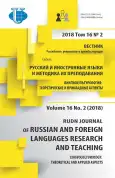The Main Trends and Principles of Modern Linguistics
- Authors: Maslova V.A.1
-
Affiliations:
- P.M. Masherov Vitebsk State University
- Issue: Vol 16, No 2 (2018): LINGVOCULTUROLOGY: THEORETICAL AND APPLIED ASPECTS
- Pages: 172-190
- Section: Cultural Linguistics: Theoretical and Applied Aspects
- URL: https://journal-vniispk.ru/2618-8163/article/view/345800
- DOI: https://doi.org/10.22363/2313-2264-2018-16-2-172-190
- ID: 345800
Cite item
Full Text
Abstract
The article identifies and describes the main trends and principles of modern linguistics such as integrativity, anthropocentricity, communicativeness, dialogicness, discursiveness, culturecentricity, interest in deep language knowledge, which interact even in one research. Taking the human factor into account is the most important characteristic of post-nonclassical science, and therefore the anthropocentric vector of modern linguistic research contributes to the emergence of most of these principles. In the twenty-first century, all humanities including linguistics are changing under the new demands of the modern social situation: first of all, due to a higher level of synthesis of humanities, their integrativity not only among themselves, but also with natural sciences. For such a complex research object as language, representatives of many sciences can contribute - from molecular biology, genetics, neurophysiology and psychology to anthropology, neurolinguistics and analytical philosophy. Research specialization should be found, as V.I. Vernadsky points out, “not in science, but in problems”, because the removal of information barriers between the sciences gives a powerful impetus for the research development. Thanks to these tendencies and principles, linguistics started exploring the problems that previously were not part in its sphere of interest. Now the sphere of interest of linguistics includes everything that meets the requirements of sign systems theory and allows to see the deep semantic foundations of language, human mentality and culture.
About the authors
Valentina Avraamovna Maslova
P.M. Masherov Vitebsk State University
Author for correspondence.
Email: mvavit@tut.by
the member of the Presidium of Higher Certifying Commission of the Republic of Belarus, Doctor of Philology, Professor, Professor of the Department of Germanic Philology, Vitebsk State University named after P.M. Masherov. Research interests: linguistic theory, cultural linguistics, linguoconceptology. The author of about 500 scientific publications, including about 30 monographs, textbooks and manuals
33, Moskovskiy Avenue, Vitebsk, 210015, BelarusReferences
- Alefirenko, N.F. (2011). Cognitive and Pragmatic Subparadigm of the Language Science. Cognitive and Pragmatic Vectors of Modern Linguistics: a Collection of Scientific Works (pp. 16—27). Moscow: Flinta; Nauka Publ. (In Russ).
- Alpatov, V.M. (1993). On the Anthropocentric and Systemcentric Approaches to Language. Questions of linguistics. 3, 15—26. (In Russ.).
- Bakhtin, M.M. (1979). Text Problems In Linguistics, Philology and Other Humanities. Experience of Philosophical Analysis. Aesthetics of verbal creativity. Moscow. (In Russ).
- Benveniste, E. (1974). General Linguistics. Moscow: Progress Publ. (In Russ).
- Berestnev, G. (2017). Synchronicity as an Object of Cognitive Linguistics. Spirituality And Mentality: The Ecology Of Language and Culture in the End of the ХХ—ХХI centuries. Lipetsk. (In Russ).
- Baudouin de Courtenay, I.A. (1963). Selected Works on General Linguistics. T. 2. Moscow: House of the USSR Academy of Sciences Publ. (In Russ).
- Buber, M. (1998). The Problem of a Human. Kiev. (In Russ).
- Wittgenstein, L. (2005). Selected Works. Translated from German and English by V. Rudnev. Moscow: “Territory of the Future” Publ. (In Russ).
- Humboldt, W. (1984). Selected Works on Linguistics. Moscow: Progress Publ. (In Russ). Humboldt, W. (1985). Language and Philosophy of Culture. Moscow: Progress Publ. (In Russ).
- Dake, T.A. (2000). Language. Cognition. Communication. Translated from English. Blagoveshchensk. (In Russ).
- Hjelmslev, L. (1970). Prolegomena to a Theory of Language. New in Linguistics. 1, 264—389. Moscow. (In Russ).
- Kamenskaya, O.L. (1990). Structure and Function of the Text as a Means of Communication. Moscow. (In Russ).
- Karaulov, Yu.N. (2004). Russian Language and Linguistic Personality. Moscow: URSS Publ. (In Russ).
- LaTableRonde (2013). A collection of materials. Linguistics of Discourse and Perspectives of Its Development in The Paradigm of Modern Slavonic Studies. Minsk: RIVSH Publ. (In Russ).
- Lurie, S.V. (2005). Psychological Anthropology: History, Current Status and Prospects: Textbook for Universities. Moscow: Academic Project: Alma Mater («Gaudeamus») Publ. (In Russ).
- Nalimov, V.V. (1993). In Search of Other Meanings. Moscow: Progress Publ. (In Russ).
- Postovalova, V.I. (1995). The Science of Language in the Aspect of the Ideal of Integral Knowledge. Language and Science of the Late 20th Century. Moscow: Institute of Linguistics RAS Publ. (In Russ).
- The Monk Iustin (Prokopovich) (2004). Philosophical Abysses. Moscow. (In Russ).
- Rubakin, N.A. (2000). Mystery of Successful Propaganda. Formats of Misunderstanding. Moscow. (In Russ).
- Sepir, E. (1993). Selected Works on Linguistics and Culturology. Moscow: Progress Publ. (In Russ).
- Stepanov, Yu.S. (1995). Alternative world, Discourse. Fact and Principle of Causality. Language and Science of the Late Twentieth Century. Moscow. (In Russ).
- Telia, V.N. (2002). The Object of Linguoculturology between the Scylla of Linguistic-Creative Technique of the Language and the Charybdis of Culture (To the Problem of the Private Epistemology of Cultural Linguistics). With Love to the Language. Moscow. (In Russ).
- Formanovskaya, N.I. (1989). Speech Etiquette and Communication Culture. Moscow: High School Publ. (In Russ).
- Tsvetaeva, M. (1994—1997). Collected works in 7 volumes. Moscow: Ellis Lak Publ. (In Russ).
- Tchernigovskaya, T. (2017). Cheshire Smile Of The Cat Schrödinger: Language And Consciousness. Moscow: Languages of Slavic Culture Publ. (In Russ).
- Shcherba, L.V. (1974). Language System and Speech Activity. Moscow. (In Russ).
- Sherzer, J. (1977). The Ethnography of Speaking: A Critical Appraisal. Saville Troike (ed) Linguistics and Antropology. Washington DC: Georgtown Un.Press Publ. (In Eng).
Supplementary files









